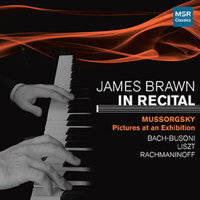
True Command
James Brawn plays Bach, Liszt,
Musorgsky and Rachmaninov -
recommended by
ANDREW SCHARTMANN'The "Promenade" ... is like butter in Brawn's hands.'
|

|
When James Brawn released the first two volumes of his Beethoven Odyssey, he established himself as one of the greatest living interpreters of Hans von Bülow's 'New Testament'. As we eagerly awaited the third installment in that series, Brawn gave us another recording, this time of music by Bach, Liszt, Mussorgsky, and Rachmaninoff. And it just so happens to be brilliant. Rarely does a performance make words seem so frivolous, but here we are. I shall try, nevertheless, to offer some remarks on the veritable event to which my ears bore witness.
Brawn's programme is not for the faint of heart, starting as it does with Busoni's arrangement of a Bach chaconne, only to be followed by Liszt's first Mephisto waltz. Those who derive pleasure from technical fireworks will be pleased with Brawn's performance; and those who value such fireworks only when they are coupled with profound artistry will be delighted. I've always admired the richness and depth of Brawn's tone, especially in technically perilous passages, with which these openers are filled. That Brawn doesn't miss a beat is admirable in itself, but that he does so while shaping beautiful phrases and managing multiple levels of tone is a sign of true command.
Yet even more impressive are the bare-bones passages. These moments stand on their own, requiring nothing more than an even hand and a staunch resistance to our natural tendency to want to 'make something' of them. Brawn clearly 'gets it', as the only defect in his playing results from a misaligned soft pedal, which causes the hammers to strike their tonal neighbors from time to time.
Listen -- Bach/Busoni: Chaconne, BWV 1004
(track 1, 12:18-13:05) © 2013 James Brawn :
That this passage is stunning all the same speaks to the degree of control Brawn wields over his instrument — and a wonderful instrument it is. Its assets come to the fore in Brawn's interpretation of Liszt's well-known Consolation in D flat major. Listen to the full and rich tone of the music's resonant bass notes, which Brawn places exquisitely. And notice how each step of the melody merges with the resonance of its forebear — a true masterclass in performance by listening.
Listen -- Liszt: Consolation No 3 in D flat, S 172
(track 3, 0:00-0:50) © 2013 James Brawn :
This sensitivity to the graded succession of notes spills over into Mussorgsky's Pictures at an Exhibition. The 'Promenade', which is too often performed like a clown crudely stomping its way to Kiev, is like butter in Brawn's hands. Even though each note receives a sharp attack, in keeping with the stately character of the music, there is no thumping along from one beat to the next. Instead the theme cycles smoothly through its many phrases, gathering force rather than brashness as it marches toward its conclusion.
Listen -- Mussorgsky: Promenade (Pictures at an Exhibition)
(track 4, 0:56-1:31) © 2013 James Brawn :
The remainder of Pictures unfolds with equally nuanced phrasing, though Brawn's prodigious balance occasionally loses its footing in the last two pieces. This is especially salient in 'The Hut on Fowl's Legs', where his right hand is occasionally drowned out by the thunderous bass. One could argue, however, that this is more Mussorgsky's fault than Brawn's: when Ravel orchestrated the piece, he left out the double basses throughout the entire right-hand descent, thus compensating for a lack of written-in balance between the parts.
Listen -- Mussorgsky: Baba Yaga (Pictures at an Exhibition)
(track 18, 0:00-1:05) © 2013 James Brawn :
Having guiding us through the massive finale of Mussorgsky's exhibition, Brawn reinstates calm with Rachmaninoff's Prelude in B minor. Although the piece swells to one of the composer's characteristic climaxes, its vectored wave breaks down into a series of ever calmer ripples before reaching shore. Brawn's navigation of this dynamic arc is spellbinding, lifting us from the visceral surge of Kiev's gate to the ethereal plane of Bach's Prelude in C major, BWV 846.
Listen -- Rachmaninov: Prelude in B minor, Op 32 No 10
(track 20, 4:26-5:42) © 2013 James Brawn :
With this program, Brawn proves his versatility as a pianist and his depth as an artist. Having now heard countless performances of this calibre from Brawn's workshop, I no longer wonder whether or not he will receive the international attention he deserves. I wonder only when the inevitable will happen.
Copyright © 8 October 2014
Andrew Schartmann,
Connecticut USA

| 
